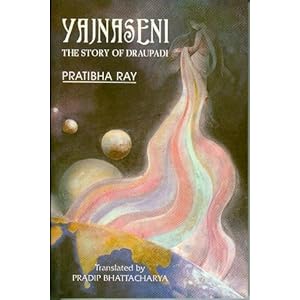Yajnaseni
By Pratibha Ray
Rupa & Co
Yajnaseni is Draupadi, princess of Panchal, Panchali, common wife to the five Pandavas, Queen of Indraprastha and perhaps the most misunderstood heroine from our mythology. Revered on the one hand as one of the five supremely virtuous women of Hindu myth (Ahalya, Tara, Mandodari, Satyavati and Draupadi), her name still bears stigma, so much so that no girl is ever named after her. Yet, she was perhaps the strongest of them all, demanding her rights in a male-dominated society, and fighting injustice any which way she could.
I must admit that I have always had a sneaking fondness for the proud princess of Panchal. I have found in her a strength that is lacking in most other mythological heroines. Sita, I have always visualised as a doormat, but masculine culture will portray her as the woman's softer side, while Draupadi is unabashedly and prominently a queen, with a woman's pride, a sharp intellect and a strong will. Very few women in Indian mythology were strong enough to speak their own minds. Imagine then, my delight in coming across a novel in which Draupadi finally comes into her own.
Yajnaseni, by Pratibha Ray, is the story of Draupadi and therefore the story of the Mahabharata, told from the perspective of one of the most important but overlooked characters - Draupadi herself. If it were not for her, the story of the Kuru dynasty would have taken quite a different turn.
Born of the sacrificial fire, in which her father invokes a son to help him defeat his archenemy Drona, she is named Krishnaa, or the dark-skinned one. Her story is familiar to anyone who has read the great epic - what is not familiar is how she felt about the various choices that were made for her - by her father, her brother, her mother-in-law, her husband, even by Lord Krishna, whom she was devoted to.
In a sense, her very birth is tragic. She is born unasked for from the sacrificial fire. After Arjuna wins the contest for her hand, she is forced into a polyandrous marriage by her mother-in-law, perhaps because Kunti wanted to protect herself from accusations from her new daughter-in-law. In spite of having five husbands, she finds herself bereft of all support in the assembly hall at Hastinapura. As she vows retaliation, she seems to be aware of being instrumental in bringing about the end of an epoch and the birth of a new age.
Here is a chance to see Draupadi as she portrays herself. Narrated in first person, we are witness to her devotion bordering on love for Lord Krishna, her shock at being made the wife of all five Pandavas, her grief, her rage and her anguish. Amidst the scene of her greatest humiliation, she finds the strength to question the Kuru elders, about the very concept of their dharma, while her husbands sit mute. She is the strength behind the Pandavas and their weakness; her impotent rage at the insults she suffers sets their feet onto the inexorable path of a great war and the destruction of a dynasty.
I wish I had read the book in its original Oriya, though. The English translation, by Pradip Bhattacharya, is a bit pedantic in style, and sometimes, the language gets too flowery. It maybe because it is difficult to translate word for word from many of our native languages, but once you get past the literary flourishes, this is a book that can hold its own. Just as Draupadi continues to hold her own, even today.
© Anuradha Warrier


Hey, you mentioned about one of my fave books as well - read Yajnaseni a few years ago and was impressed by the way Pratibha Ray took us through Draupadi's world and her thoughts and feeling. Am mighty glad that she is getting the Jnanpith Award this year for her exemplary body of work.
ReplyDeleteOn the same note, you may also like to read 'The Palace of Illusions' by Chitra Banerjee DIVAKARUNI - again on Draupadi but we see her as Panchali more and less as Draupadi. Really remarkable.
Pratibha Ray is getting the Jnanpith? That is good news indeed! I'm not a great fan of Chitra Banerjee Divakaruni, but I will put my bias aside and look out for it since you say it is good. :)
ReplyDeleteYes, she is getting the Jnanpith Award for this year ... music to my ears.
ReplyDeleteThe Palace of Illusions is the first book by Divakaruni that I read - what interested me was the way Panchali's thoughts were highlighted.
I try to read books on Mahabharata and Ramayana wherever I can lay my hands on them. Hence the effort :")
Am planning to read 'Sons of Sita' by ASHOK BANKER soon.
I am actually crazy about reading books :D
I read Banker's Prince of Ayodhya when he first wrote it; we had an interesting email discussion about it. (Disclaimer: I hated the book!) But Ashok Banker was always enthralled by JR Tolkein, and he had re-written the Ramayana as a sci-fi novel. Heard the series is a big hit, so obviously, I'm in the minority. :)
ReplyDeleteIf you want a very good (straightforward) re-telling of the Ramayana and the Mahabharata, read Ramesh Menon's books. They are excellently researched and very, very well-written.
Another good book on the Mahabharata from Bhima's perspective is Randam Muzham, a Malayalam novel by MT Vasudevan Nair. It is available in English translation as 'Second Turn'. Penguin, I think.